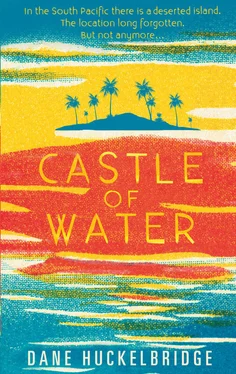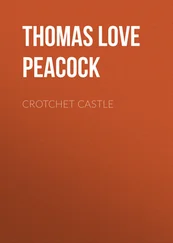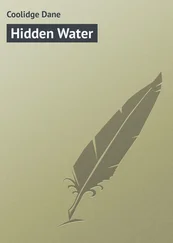Dane Huckelbridge - Castle of Water
Здесь есть возможность читать онлайн «Dane Huckelbridge - Castle of Water» — ознакомительный отрывок электронной книги совершенно бесплатно, а после прочтения отрывка купить полную версию. В некоторых случаях можно слушать аудио, скачать через торрент в формате fb2 и присутствует краткое содержание. Жанр: unrecognised, на английском языке. Описание произведения, (предисловие) а так же отзывы посетителей доступны на портале библиотеки ЛибКат.
- Название:Castle of Water
- Автор:
- Жанр:
- Год:неизвестен
- ISBN:нет данных
- Рейтинг книги:3 / 5. Голосов: 1
-
Избранное:Добавить в избранное
- Отзывы:
-
Ваша оценка:
- 60
- 1
- 2
- 3
- 4
- 5
Castle of Water: краткое содержание, описание и аннотация
Предлагаем к чтению аннотацию, описание, краткое содержание или предисловие (зависит от того, что написал сам автор книги «Castle of Water»). Если вы не нашли необходимую информацию о книге — напишите в комментариях, мы постараемся отыскать её.
Castle of Water — читать онлайн ознакомительный отрывок
Ниже представлен текст книги, разбитый по страницам. Система сохранения места последней прочитанной страницы, позволяет с удобством читать онлайн бесплатно книгу «Castle of Water», без необходимости каждый раз заново искать на чём Вы остановились. Поставьте закладку, и сможете в любой момент перейти на страницу, на которой закончили чтение.
Интервал:
Закладка:
The man with the paper bag does not notice them, however. His mind is on other things. He walks with serene intent through the inordinate quietude and beauty of the place, a monument to France itself. The fading names above the crypts are soft as feathers when uttered upon the lips—which he does, without a breath, with hardly a sound, the downy purr of double r’s, the agile sweep of accents aigus .
His path takes him beneath a wicker of frosted elm trees, down a brief and chestnut-scattered embankment, to a cluster of old family plots on the cemetery’s edge. He goes delicately but with purpose—he knows the way, he is intimate with these surroundings. The American students trail behind by a respectful distance. They are curious but have no wish to disturb him. Wait until we tell our friends back home, they say, the insatiable lot of them murmuring as one.
The man stops at last in front of a grave, newer and less faded than the rest. The moss has yet to even stake its claim. The students hold back; they suddenly feel guilty, unintentionally intrusive. But they know they can’t turn away. They look on as the object of their curiosity kneels before the grave. His head is bowed, and his hands are resting upon the headstone. He seems to be speaking—but what is he saying? They can’t make out a single word. Whatever it is, it goes on for some time, until at last, his vigil concluded, the man wipes his eyes and rises to his feet. He takes something from the paper bag, something thick and clustered—what, they’re not certain—and sets it down upon the grave. Then he turns and walks away.
The students wait until he is well out of sight before they dare approach. They are flabbergasted by what they have seen. Whose grave is this, anyway? they wonder aloud. And, like, what kind of flowers were those, exactly? They gather about the headstone in the cold morning light, the four of them shivering and goosefleshed and dying to know.
The marble is inscribed with a name they don’t recognize—it sounds French, but they’ve never seen it before. And as if that weren’t enough, the flowers the man left behind are not flowers at all. Instead, resting atop the grass and loam and dried husks of chestnuts is something bizarre, something out of place, something that they can neither understand nor believe.
A single bunch of green bananas.
The American students shake their heads and relight their cigarettes. They purse their lips and exhale in wonder. What exactly just happened? one of them asks, a girl in blue jeans and artfully trimmed bangs. I mean, like, do you think the stories are true? I have no idea, another answers, scuffing the cobblestones with his canvas sneaker. But it beats the hell out of Jim Morrison any day. And I’m, like, totally starving. Anybody want to go get breakfast?
They all do. And they count the crumpled remainder of the night’s euros to make sure they have enough, and they leave the bananas behind for the departed to keep.
2
At the first sputter of the engine and hint of a downward pitch, Barry Bleecker had uttered a prayer. He had prayed for a miracle. And a miracle was precisely what he received, although perhaps not one as helpful as he had hoped. For despite his entreaties to God, Buddha, Allah, and Vishnu, the engine did not kick back to life, the little Cessna 208 Caravan did not cease its dive, and no, he was not spared the soul-wrenching impact. The screams, the weeping, the bracing for death—all of that went on as fate had planned. But Barry, still semiconscious amid the floating debris and flaming oil, was spared his contact lenses and a single bottle of saline solution—neither of which seemed particularly miraculous, drifting by in a sealed Ziploc baggy at that dark and desperate moment. He almost forgot to gather them up, preoccupied as he was with staying afloat and expelling the salt water from his lungs. But gather them he did, perhaps compelled by the hint of buoyancy that the baggy provided. He tucked it up under his shirt, moaned once more toward the god(s) he assumed had forsaken him, and pushed off from the smoking hunk of fuselage to which he had been clinging barnacle tight . . . from the blue haze of the horizon, a fringe of palm beckoned.
The promise of firm ground proved more elusive than Barry had thought. The swim felt interminable, and in the dips between swells, when he lost sight of his destination, he nearly gave up hope. But the pure, reptilian desire to prevail goaded him on. His leaden arms kept paddling, his wooden legs never ceased to kick. When his body was finally washed up, dragged back, and then washed up again onto the sand, he wept like a baby, rolling onto his back, roaring with grief, although for what he did not know. Once that wellspring of emotion ran itself dry, he sat up, blinked, and looked at his surroundings. Or at least attempted to look—what met his eyes was a myopic blur. At some point—possibly in the crash, but more likely during his ordeal in the water—Barry Bleecker had lost both of his contact lenses. A loss of vision that could easily lead to a loss of life for a horribly nearsighted man stranded on a desert island 2,359 miles from Hawaii, 4,622 miles from Chile, and 533 miles from the nearest living soul. And at that moment, on the palm-lined rim of an uninhabited South Pacific atoll, Barry Bleecker was just such a fellow. Or almost such a fellow. For no sooner had he realized his predicament than he remembered the Ziploc baggy, which by then had tumbled from beneath his sopping Charles Tyrwhitt dress shirt and settled atop the soggy crotch of his Brooks Brothers slacks. At which point Mr. Bleecker, nerves and clothing equally frayed, laughed hysterically. A miracle, after all.
Barry dragged himself a few yards to drier ground, whisked the sand from his fingers, and peeled open the precious plastic bag. The foil top of the first contact lens package (there were six packages, which meant three pairs) was stubborn but gave. He set one on the tip of his index finger and examined it like the precious jewel that it was. Then, after a quick and cleansing splash with the saline solution, he plunked it into his eye. Hallelujah! What had been an inscrutable haze transformed with a blink into a vivid seascape. With a pirate’s one-eyed squint, Barry took stock of the foam-wreathed shoreline, the waltzing fronds, and the dappling of cirrus clouds that crawled across an otherwise impeccably blue sky (the storm that downed them having by that point passed). It was midday, and the sun was high. Quickly, he inserted the other contact as well and took to absorbing his new environs in their full three-dimensional splendor. On rubbery legs he executed his first tottering steps, calling out for help as he explored the beach. He walked for some time, shouting through cupped hands and listening through cupped ears, with waves and rustling the only response. And then his heart leapt—up ahead, a set of footprints in the sand. A tart joy overtook Barry as he raced forward, nearly tripping over the tattered cuffs of his slacks. Footprints! It could only mean . . . And then he stopped in his tracks. Literally his tracks. The footprints were his own. He had circled the entire island, and he was suddenly horrified by both his loneliness and its tininess. Circumnavigating the thing had taken less than ten minutes. And Barry wept, not for the first time on that diminutive island and certainly not for the last.
The arrival of night brought Barry little solace. The screams of tree frogs and the pitched chatter of insects, yes, but no solace. Crouched and shivering in a crude bower of palm fronds, surrounded by darkness, he reached instinctively to his pocket for a cigarette, only to dump out their mashed remains. In doing so, however, he remembered the plastic Bic that was tucked in the cellophane. And that, unlike his Parliament Lights, was still serviceable—he flicked at the flint and summoned a flame. And an idea came to him: a signal fire. Surely rescue planes would be out combing the waves. They would likely even pass over the island in their search for survivors. Barry struggled to his feet, again tripping over his tattered cuffs, and began gathering the driest palm fronds he could. After several trips to the beachhead, he had a rather impressive pile and, after a few dabs of his lighter, a convincing flame. He stood beside it, watching and waiting, certain the spotlights of some chopper or seaplane would come blazing from the murk. When they didn’t, and the fire burned down to embers, he scurried for more fronds to resuscitate it—an exercise that proved less than fruitful. Halfway into his second armful, it began to rain. Not a demure tropical sprinkle, but an honest-to-goodness downpour. Barry hurried back to his palm bower and huddled beneath its meager shelter. At some point, exhausted, he curled up to sleep, but on the cusp of obtaining it, he realized he had forgotten to take out his contacts. Crap. With exquisite tenderness, he removed each from its respective eye and deposited it carefully into its respective holder. He placed the plastic case in his pocket, beside the suddenly priceless Bic, and finally, blanketed by chill rains, lulled by the high whine of midges, he fell headfirst into a cavernous slumber.
Читать дальшеИнтервал:
Закладка:
Похожие книги на «Castle of Water»
Представляем Вашему вниманию похожие книги на «Castle of Water» списком для выбора. Мы отобрали схожую по названию и смыслу литературу в надежде предоставить читателям больше вариантов отыскать новые, интересные, ещё непрочитанные произведения.
Обсуждение, отзывы о книге «Castle of Water» и просто собственные мнения читателей. Оставьте ваши комментарии, напишите, что Вы думаете о произведении, его смысле или главных героях. Укажите что конкретно понравилось, а что нет, и почему Вы так считаете.










